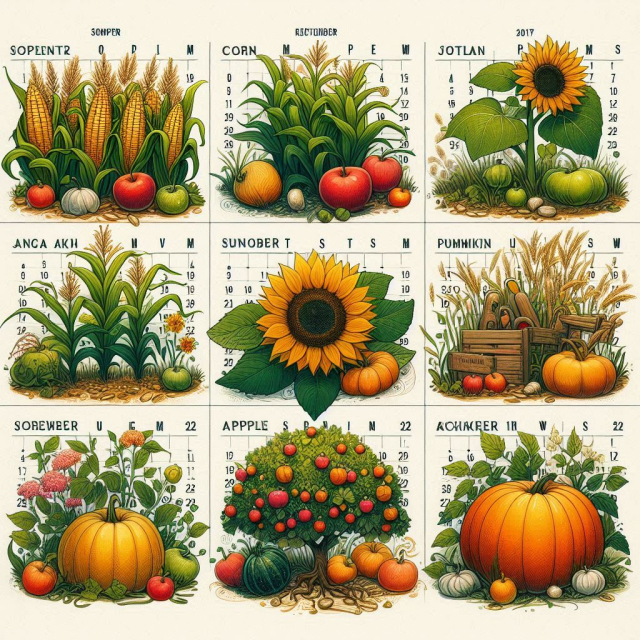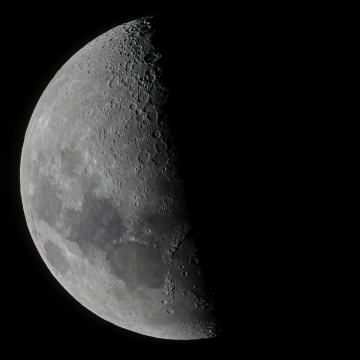The influence of the lunar phases on agriculture is an ancient belief and practice that has been maintained throughout the centuries. The cycles of the moon affect the tides and, according to many farmers, also influence plant growth. In December 2025, the ideal days to grow crops based on the moon can maximize crop success and health. This article explores in detail the best dates and practices to make the most of lunar energy in agriculture.
Phases of the Moon and their Influence on Agriculture.
The moon goes through four main phases each month: new moon, waxing moon, full moon, and waning moon. Each phase has a specific impact on plant growth and agricultural activities.
- New Moon: This is the time when the moon is not visible from Earth. It is an ideal period for sowing seeds that will grow underground, such as carrots, beets and other roots. The new moon favors the development of strong roots.
- Waxing Quarter: The waxing phase is when the moon begins to increase its luminosity. It is the optimal time to plant plants that grow above ground, such as lettuce, spinach, grains and herbs. Plants planted in this period tend to have vigorous and healthy growth.
- Full Moon: The full moon is when the moon is completely illuminated. This period is excellent for transplanting and planting crops that require a greater amount of water. Plant sap is at its peak, making rooting and growth easier.
- Last Quarter: During the last quarter, the moon's light decreases. It is the right time for harvesting, pruning and weeding. Maintenance activities carried out in this phase can help plants focus their energy on producing fruits and flowers.
Lunar Calendar for December 2025.
To make the most of the lunar influences, it is crucial to know the specific lunar calendar for December 2025. Below are the key dates and recommended farming activities.
December 1: New Moon.
- Recommended activities: Planting roots, carrots, beets and other tubers. Soil preparation and addition of compost.
December 8: Waxing Quarter
- Recommended activities: Planting leafy vegetables, such as lettuce, spinach and cabbage. Ideal for planting aromatic herbs and ornamental flowers.
December 15: Full Moon.
- Recommended activities: Transplanting seedlings. Planting fruit trees and vineyards. Deep watering to ensure rooting.
December 22: Last Quarter.
- Recommended activities: Harvesting ripe fruits and vegetables. Pruning trees and bushes. Removal of weeds and diseased plants.
December 29: Next New Moon.
- Preparation for the next cycle: Preparation of the soil for the next planting. Addition of organic fertilizers and fertilizers.
Practical Tips for Growing According to the Moon.
Soil Preparation.
Soil preparation is essential for the success of any crop. During the new moon, it is recommended to till the soil and enrich it with compost and organic fertilizers. This provides a nutrient-rich base that encourages the development of strong roots.
Sowing and Transplanting.
The crescent and full moon phases are the most favorable for planting and transplanting. During the first quarter, seeds have a greater drive to germinate and grow. The full moon, for its part, favors the rooting of transplanted plants due to the high concentration of sap.
Irrigation and Fertilization.
Watering is crucial during all lunar phases, but especially during the full moon. The full moon enhances the absorption of water and nutrients, which is essential for plant development. Fertilization should also be done during the growing season to maximize nutrient absorption.
Pruning and Maintenance.
The last quarter is the best time for pruning and maintenance. Pruning during this phase helps plants recover more quickly and focus their energy on fruit and flower production. Additionally, it is a suitable time to remove weeds, as their growth slows down.
Harvest.
Harvesting during the last quarter ensures that products have greater durability and better quality. Plants harvested at this stage tend to have less water content, making them more resistant to storage.
Benefits of Cultivating According to the Moon Phases.
Improvement of the Quality and Quantity of Crops.
Following the lunar calendar can result in more abundant and better quality crops. Plants planted and harvested at the right times have a better chance of thriving and producing healthy fruit.
Efficient Use of Resources.
Cultivation based on moon phases can help farmers use resources more efficiently. For example, planting and watering at optimal times can reduce the need for fertilizers and pesticides, which is also beneficial for the environment.
Connection with Nature.
Following the lunar phases not only improves agricultural productivity but also encourages a greater connection with nature. This holistic approach promotes sustainable agricultural practices that respect the natural environment.
Plant Stress Reduction.
Agricultural activities carried out in harmony with the lunar cycles tend to be less stressful for plants. This translates into a lower risk of diseases and pests, and stronger, more resilient plants.
Growing according to the lunar phases is a practice that combines ancient wisdom with modern science. Although not all beliefs about lunar influence are supported by strong scientific evidence, many farmers have seen significant improvements in the health and yield of their crops by following the lunar calendar.
In December 2025, the lunar phases offer multiple opportunities to optimize agricultural activities. From planting roots during the new moon to harvesting at the last quarter, each phase provides specific benefits that can be harnessed to maximize crop success.
By integrating these practices into farming routines, farmers can not only improve the productivity of their lands, but also strengthen their connection to natural cycles and promote more sustainable and eco-friendly practices.
Following the lunar calendar may require planning and adaptation, but the potential benefits to plant health and resource efficiency make it worth the effort. Lunar farming, when practiced with knowledge and care, can be a valuable tool for any farmer committed to sustainability and excellence in production.






